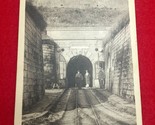WW1 - Verdun - France, An Entrance Of the Citadel's Underground Galleries7 KM...
Don't miss out on this item!
There is only 1 left in stock.
Shipping options
Estimated to arrive by Thu, Jul 31st.
Details
This estimate is based on:
- The seller's handling time
- USPS Ground Advantage (2 to 3 business days) transit time to US
Actual delivery times may vary.
Have shipping questions? Contact the seller
FREE via USPS Ground Advantage (2 to 3 business days) to United States
Offer policy
OBO - Seller accepts offers on this item.
Details
You can make your offer during the checkout process as long as you do not live in a state where marketplace facilitator tax laws exist.
Check your state.
Return policy
Full refund available within 30 days
Payment options
PayPal accepted
PayPal Credit accepted
Venmo accepted
PayPal, MasterCard, Visa, Discover, and American Express accepted
Maestro accepted
Amazon Pay accepted
Nuvei accepted
Shipping options
Estimated to arrive by Thu, Jul 31st.
Details
This estimate is based on:
- The seller's handling time
- USPS Ground Advantage (2 to 3 business days) transit time to US
Actual delivery times may vary.
Have shipping questions? Contact the seller
FREE via USPS Ground Advantage (2 to 3 business days) to United States
Offer policy
OBO - Seller accepts offers on this item.
Details
You can make your offer during the checkout process as long as you do not live in a state where marketplace facilitator tax laws exist.
Check your state.
Return policy
Full refund available within 30 days
Payment options
PayPal accepted
PayPal Credit accepted
Venmo accepted
PayPal, MasterCard, Visa, Discover, and American Express accepted
Maestro accepted
Amazon Pay accepted
Nuvei accepted
Item traits
| Category: |
Non-Topographical Postcards
|
| Quantity Available: |
Only one in stock, order soon
|
| Condition: |
Used
|
| Theme: |
Militaria
|
| Seller Notes: |
View details
“Authentic Antique WW1 unused postcard in fine condition. Please visit our store to check similar antique postcards.”
|
Listing details
|
Shipping discount:
|
Seller pays shipping for this item.
|
|
Posted for sale:
|
More than a week ago
|
|
Item number:
|
1367948580
|
Postcard Details
Verdun - France, An Entrance Of the Citadel's Underground Galleries.
History Of Verdun and Postcard
Verdun, the name of a citadel, but also the name of the deadliest battle of WWI. The largest city in the Meuse department, it has always been coveted because of its strategic location, a stone’s throw from Belgium, Luxembourg and Germany.The Gaulish stronghold of Verdodunum developed over 2,000 years ago.However, Verdun appeared in the history of France in 843AD, when the Charlemagne's empire was divided between his 3 grandsons, at the death of their father Louis the Pious.The frontiers of their respective kingdoms changed over the centuries.However, they correspond roughly to present day France, Germany and Lorraine.
The land Lothaire inherited became known as Lotharingia (Lothaire’s land), present day Lorraine.Verdun became a Free Imperial City of the Holly Roman Empire from 14th to the 16th century.
La Citadelle,The city had been fortified since ancient times.However, Marshal Vauban built the Citadelle in the 17th century.Verdun remained an important garrison town until the 18th century.
The Prussians captured it, however, at the beginning of the French Revolution. They indeed attempted to march on Paris, but were defeated at the Battle of Valmy on September 20, 1792.
They attacked it again during the Franco-Prussian War of 1870-71; Verdun was the last stronghold to surrender. Germany annexed Alsace and part of Lorraine on May 10, 1871 with the Treaty of Frankfurt.
The Meuse remained French, however, Verdun was located a mere 45kms away from the German border!Ten defense forts were immediately built around the city in order to protect the region. Between 1880 and 1914, a second defense belt was built in a 45km perimeter. It included 43 new forts and strongholds. This gigantic line of defense, centered on the underground citadel of Verdun, included Douaumont and Vaux.
These two forts played a prime role during the Battle of Verdun from February 21 to December 20, 1916.Verdun was the epicenter of this conflict that cost the death of thousands of soldiers.
Indeed, the Germans positioned themselves on 3 sides of Verdun and therefore isolated the citadel in a salient.
The 4 km of underground galleries, dug under the citadel between 1886 and 1893, were extended to 7km during WWI. A whole infrastructure was also put in place in order to accommodate up to 2000 soldiers. This included ammunition and powder magazines, a telegraphy and telephone station, a water supply network, but also a mill, a bakery, kitchens etc .
The picture in the postcard is of the above gallery. This gallery is converted to museum now and open to the public.
[History Source - Travel France Online]
